 Petzlover
Petzlover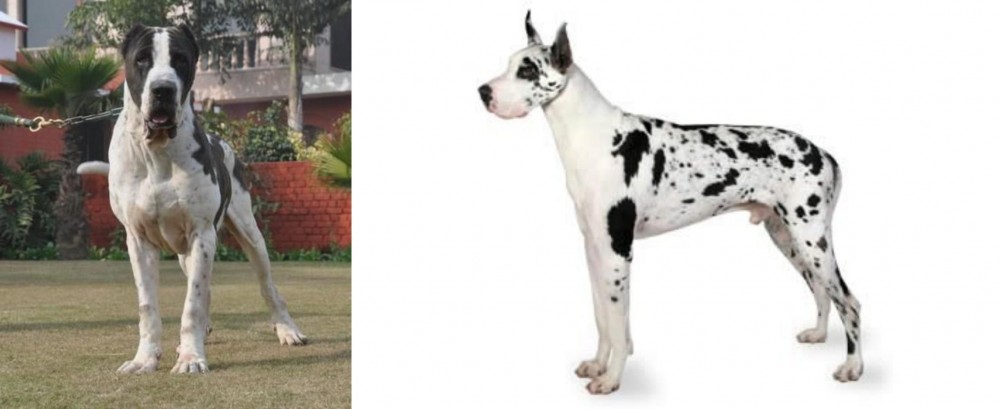 Bully Kutta is originated from India but Great Dane is originated from Germany. Both Bully Kutta and Great Dane are having almost same height. Both Bully Kutta and Great Dane are of same weight. Both Bully Kutta and Great Dane has same life span. Bully Kutta may have less litter size than Great Dane. Both Bully Kutta and Great Dane requires Low Maintenance.
Bully Kutta is originated from India but Great Dane is originated from Germany. Both Bully Kutta and Great Dane are having almost same height. Both Bully Kutta and Great Dane are of same weight. Both Bully Kutta and Great Dane has same life span. Bully Kutta may have less litter size than Great Dane. Both Bully Kutta and Great Dane requires Low Maintenance.
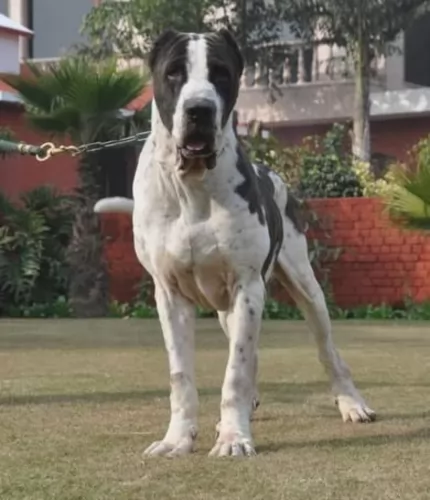 This well built, powerful dog breed is also known as Indian Alangu Mastiff or Pakistani Mastiff. These dogs come from the Punjab and Sindh region of the Indian subcontinent. It is believed that mastiff dogs came with British soldiers during the British invasion, however English Mastiffs, Bulldogs, Bull Terriers and Great Danes are seen as potential ancestors of this large dog.
This well built, powerful dog breed is also known as Indian Alangu Mastiff or Pakistani Mastiff. These dogs come from the Punjab and Sindh region of the Indian subcontinent. It is believed that mastiff dogs came with British soldiers during the British invasion, however English Mastiffs, Bulldogs, Bull Terriers and Great Danes are seen as potential ancestors of this large dog.
There are disputes about the country of origin of this breed, and some people claim that the dog comes from India, while others say it comes from Pakistan. Certainly in Pakistan these dogs are still used for fighting.
 Known as the Deutsche Dogge or Apollo of dogs, the giant-breed Great Dane hails from Germany and not Denmark as many people believe.
Known as the Deutsche Dogge or Apollo of dogs, the giant-breed Great Dane hails from Germany and not Denmark as many people believe.
The large Great Dane has been around for about 400 years already. They descend from mastiff-like dogs, being needed to protect country estates.
In the 18th century, apart from watching over estates, they were also popular with the upper class for sport.
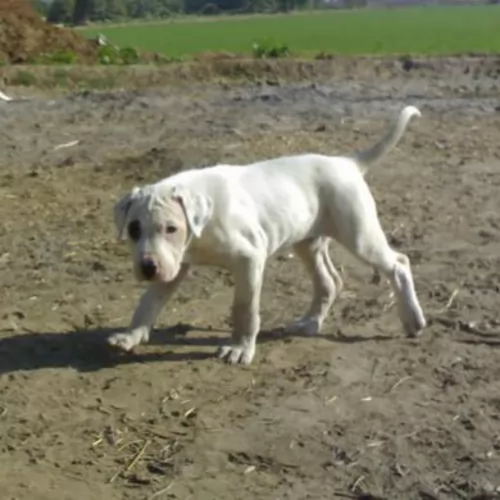 The Bully Kutta is a big, heavy, muscular dog, standing at roughly 81 – 89cm and weighing in at 70–90kg. He isn’t particularly good with children or with other pets simply because the dog is aggressive by nature. If you do opt for this large breed, you’re going to need a large garden and he is going to require a lot of exercise.
The Bully Kutta is a big, heavy, muscular dog, standing at roughly 81 – 89cm and weighing in at 70–90kg. He isn’t particularly good with children or with other pets simply because the dog is aggressive by nature. If you do opt for this large breed, you’re going to need a large garden and he is going to require a lot of exercise.
This is a dog breed that is going to require socialization and training if you want him to be obedient and calm, as he is inclined to be a dominating breed. He’s an intelligent dog and when well trained, he makes a splendid pet with firm, fair owners.
The Bully Kutta has a large, broad head which is supported by a thick well-muscled neck. The skin around his lower jaw is loose. The ears are short, set high and are mostly cropped, but other times they are left to flop over. The tail is sometimes docked but these days mostly left long and tapered.
He has a short smooth coat and is essentially white in color although the coat can also be fawn, brown, black or brindle.
 The Great Dame is a tall, lean, athletic, muscular, elegant looking dog. He can stand anything between 76–86cm in height and weigh around 54–90kg. The large head is long and narrow, and the medium sized floppy ears can be left or they can be cropped.
The Great Dame is a tall, lean, athletic, muscular, elegant looking dog. He can stand anything between 76–86cm in height and weigh around 54–90kg. The large head is long and narrow, and the medium sized floppy ears can be left or they can be cropped.
The tail is long and held low. The coat is short and smooth and can be in several colors such as fawn, black or brindle.
Any kind of aggressiveness was bred out of the Great Dane and today he is a gentle giant of a dog, getting on well with other dogs, children and everyone in his human family.
Even though he is a gentle giant, he will still require training and socialization just because of his size. Then they become the devoted pet that they are so well known to be. You'll want to know that when he comes indoors, he will obey you when you tell him to lie-down, sit or come, otherwise his sheer size will see him knocking things accidentally off table-tops.
He is an intelligent dog and is eager to please so he'll learn easily. He craves human companionship, so make sure that your social Dane has plenty of interaction with you.
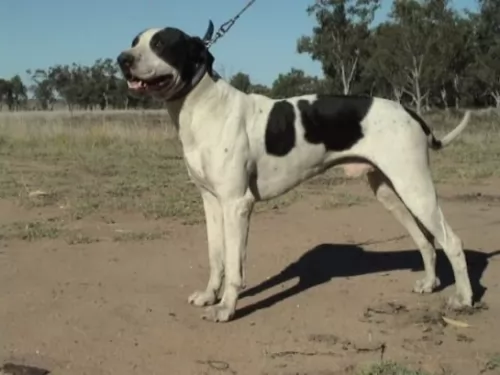 The Bully Kutta is a powerful, imposing dog and they have been nicknamed the ‘Beast from the East’. Unfortunately it is this dog’s thick bones, his looks and his strength that have him used for cruel dog fighting in Pakistan.
The Bully Kutta is a powerful, imposing dog and they have been nicknamed the ‘Beast from the East’. Unfortunately it is this dog’s thick bones, his looks and his strength that have him used for cruel dog fighting in Pakistan.
When not used for fighting, he makes a loyal, devoted companion for the owner who ensures proper socialization and training. Well raised Bully Kuttas are then good with children, being loving, protective and playful.
One just hopes that the future of this giant dog breed is brighter, and that he will be looked upon as more of a companion that just a dog-fighting object to bring in money for his owner.
 The Great Dane is a large breed, bred to hunt wild boar. The intelligence, bravery and fearless nature of the dog meant that he was sought after for this task.
The Great Dane is a large breed, bred to hunt wild boar. The intelligence, bravery and fearless nature of the dog meant that he was sought after for this task.
Known as the Apollo of Dogs, you won’t find the Great Dane being used for hunting purposes anymore, being more suited as a companion dog.
While developed as a working breed, today he is a well balanced, intelligent, calm, loving, social, dependable dog that just wants to be loved by his human family and to provide love, loyalty and companionship back in return.
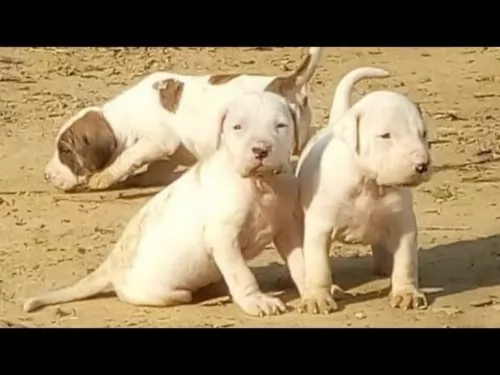 Your Bully Kutta is generally a healthy dog and not often affected by hereditary diseases, but with giant breeds such as this you will have to look out for diseases common to large dogs.
Your Bully Kutta is generally a healthy dog and not often affected by hereditary diseases, but with giant breeds such as this you will have to look out for diseases common to large dogs.
Typical illnesses to watch out for will include hip dysplasia, arthritis, skin allergies and bloat.
This is an inherited condition where the hip joint is improperly formed. For your Bully Kutta it causes wear and tear as well as stiffness in the hips and your dog battles to rise after lying down.
Arthritis in your dog can be managed but it can cause a lot of discomfort for him. This inflammation of the joints can cause pain and stiffness. It is more often seen in older dogs. It can also start at an early age because of problems with bone and joint development and abnormal rubbing within the joint.
Today there are a number of therapy options that can bring some kind of relief to your dog.
 Typically of giant dogs, the Great Dane doesn't have a particularly long life-span and will live to be about 8 to 10 years of age. Also, giant-breed dogs like this are susceptible to what is known as bloat.
Typically of giant dogs, the Great Dane doesn't have a particularly long life-span and will live to be about 8 to 10 years of age. Also, giant-breed dogs like this are susceptible to what is known as bloat.
You'll notice it because there is swelling of the stomach with gas buildup and also twisting of the stomach. It's a life-threatening condition and you'll need to get your dog to the vet as soon as possible. You can combat it by feeding him smaller, more frequent meals and perhaps buying a slow-feeder dish, forcing your hungry pet to eat slower and not gulp his food down.
Also, large dogs like this can develop hip dysplasia and with a dog like the Great Dane, it takes a while for the bones and joints to grow and then become stable. That is why it is important not to make him do any vigorous exercise till he is at least 18 months of age, as these exercises can put a lot of stress on the joints and bones which can lead to hip dysplasia later on.
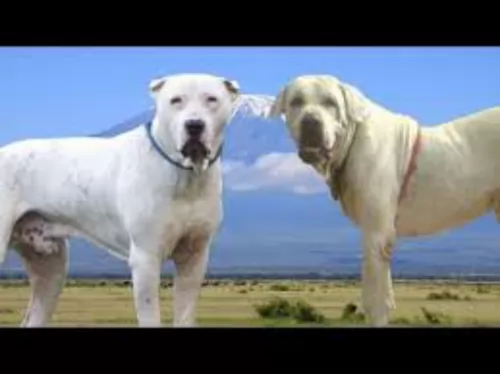 The short coat is low maintenance and as a moderate shedder too, all that is required really is to give your Bully Kutta a good brush twice a week to keep the coat in good condition.
The short coat is low maintenance and as a moderate shedder too, all that is required really is to give your Bully Kutta a good brush twice a week to keep the coat in good condition.
Brush his teeth 2 or 3 times a week with special canine-toothpaste and toothbrush to prevent plaque build-up. He’s a drooler too, so you will need to wipe his face and maybe your clothes of slobber from time to time.
This strong, muscular dog of yours will require an excellent diet. It’s always wonderful if you can give him home-made food such as vegetables, rice and meat. These days you get excellent commercially manufactured food for dogs, and your vet can advise you on the best food for a large, active dog such as the Buly Kutta.
Raw meat is absolutely essential for your dog from time to time and will ensure that his coat doesn’t become dull and with bald spots. Remember, that before dogs were domesticated they used to live on raw meat, so see that he gets some raw meat to prevent skin disorders. Make sure your large pet has a constant supply of fresh, cool water.
Bully Kuttas are going to need a walk every day in the form of exercise. If he is socialized you can take him into the park for ball games. He is a dog that will require plenty of space.
 This is a large dog so you’ll notice that with commercially manufactured dog foods, there are those made specially for large- or giant breeds. It is important to choose the right dog food for his large size so that you can be sure he gets the right amount of nutrients in for him to grow strong and healthy.
This is a large dog so you’ll notice that with commercially manufactured dog foods, there are those made specially for large- or giant breeds. It is important to choose the right dog food for his large size so that you can be sure he gets the right amount of nutrients in for him to grow strong and healthy.
If you aren't sure about what food would most benefit your Great Dane, ask your vet. While it is important to also feed him quality home-made food and raw meat, when buying kibble for him,check the label of the food you buy him and make sure that the concentration of protein isn’t more than 23 to 25%.
Remember to provide him with a constant supply of fresh, cool water.
Brush your Great Dane’s coat at least twice a week. He has a short, smooth coat so it will be easy, and the brushing will keep his coat soft and shiny. Use this time to also check for fleas and ticks or lumps. You will also need to check his nails and trim them if they don’t trim down on their own.
Your Great Dane will need to be exercised every day if you want him to maintain his lean, muscular shape. It keeps him happy too. He isn’t the kind of dog though that you want to turn into your running partner when you go jogging or cycling. He can go on a walk and play in the garden, but the exercising shouldn’t be for long periods of time.
Every puppy needs to get to the vet for his first check-up when he is 6 weeks of age, and your Dane will also have to. As a puppy he will need to be de-wormed which will happen with this 6 week check up. He will also be vaccinated for distemper.